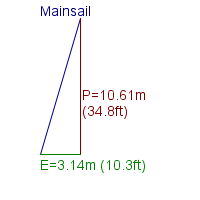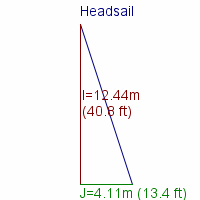Review of Bristol 31 XL
Basic specs.

If you have a photo you would like to share: Upload Image
Looking for a new boat? Find a Bristol 31 XL or similar boat for sale
The hull is made of fibreglass. A hull made of fibreglass requires only a minimum of maintenance during the sailing season.
The Bristol 31 XL is built with a masthead rig. The advantage of a masthead rig is its simplicity and the fact that a given sail area - compared with a fractional rig - can be carried lower and thus with less heeling moment.
Fin keel
The Bristol 31 XL is built with a fin keel. The fin keel is the most common keel and provides splendid manoeuvrability. The downside is that it has less directional stability than a long keel.
The keel is made of iron. Many people prefer lead keel in favour of iron. The main argument is that lead is much heavier than iron and a lead keel can therefore be made smaller which again result in less wet surface, i.e. less drag. In fact iron is quite heavy, just 30% less heavy than lead, so the advantage of a lead keel is often overstated. As the surface of a fin type keel is just a fraction of the total wet surface, the additional surface area created by the cast iron keel in comparison to a lead keel of the same weight would be negligible for cruising yachts.
The boat can enter most marinas as the draft is just about 1.52 - 1.62 meter (4.99 - 5.29 ft) dependent on the load.
The boat may be equipped with an inboard Universal Atomic 4 gasoline engine at 30 hp (22 kW). Calculated max speed is about 6.0 knots
Sailing characteristics
This section covers widely used rules of thumb to describe the sailing characteristics. Please note that even though the calculations are correct, the interpretation of the results might not be valid for extreme boats.
What is Theoretical Maximum Hull Speed?
The theoretical maximal speed of a displacement boat of this length is 6.7 knots. The term "Theoretical Maximum Hull Speed" is widely used even though a boat can sail faster. The term shall be interpreted as above the theoretical speed a great additional power is necessary for a small gain in speed.
Sailing statistics
This section is statistical comparison with similar boats of the same category. The basis of the following statistical computations is our unique database with more than 26,000 different boat types and 350,000 data points.
The ballast ratio for Bristol 31 XL is 33%.
What is Displacement Length Ratio?
The DL-ratio for Bristol 31 XL is 331 which categorizes this boat among 'heavy cruisers'.
What is SA/D (Sail Area Displacement ratio)?
The SA/D for Bristol 31 XL with ISO 8666 reference sail is 14.5, with a 135% genua the SA/D is 17.6.
Maintenance
Dimensions of sail for masthead rig.


Are your sails worn out? You might find your next sail here: Sails for Sale
If you need to renew parts of your running rig and is not quite sure of the dimensions, you may find the estimates computed below useful.
| Usage | Length | Diameter | ||
| Mainsail halyard | 27.8 m | (91.3 feet) | 10 mm | (3/8 inch) |
| Jib/genoa halyard | 27.8 m | (91.3 feet) | 10 mm | (3/8 inch) |
| Spinnaker halyard | 27.8 m | (91.3 feet) | 10 mm | (3/8 inch) |
| Jib sheet | 9.4 m | (31.0 feet) | 12 mm | (1/2 inch) |
| Genoa sheet | 9.4 m | (31.0 feet) | 12 mm | (1/2 inch) |
| Mainsheet | 23.6 m | (77.5 feet) | 12 mm | (1/2 inch) |
| Spinnaker sheet | 20.8 m | (68.2 feet) | 12 mm | (1/2 inch) |
| Cunningham | 3.1 m | (10.3 feet) | 10 mm | (3/8 inch) |
| Kickingstrap | 6.3 m | (20.6 feet) | 10 mm | (3/8 inch) |
| Clew-outhaul | 6.3 m | (20.6 feet) | 10 mm | (3/8 inch) |
This section is reserved boat owner's modifications, improvements, etc. Here you might find (or contribute with) inspiration for your boat.
Do you have changes/improvements you would like to share? Upload a photo and describe what you have done.
We are always looking for new photos. If you can contribute with photos for Bristol 31 XL it would be a great help.
If you have any comments to the review, improvement suggestions, or the like, feel free to contact us. Criticism helps us to improve.
